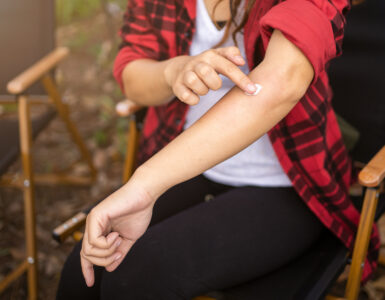Traumatic brain injuries are most common among 16 to 25 year olds and occur more often in men than women. Seniors and children are also at risk for TBIs. Traumatic brain injuries can result in disability. Approximately 2% of the population requires long-term assistance with daily activities.
Dr. Colby Hansen, specialist in physical medicine and rehabilitation guests on Studio 5.
Most Common Causes of Traumatic Brain Injury
• Falls (highest rates in kids <4 years old and elderly> 75 years old)
• Car accidents (result in greatest number of TBI related hospitalizations)
• Sports
• Recreational activities
Signs of a Traumatic Brain Injury
If someone has sustained a TBI, they may experience any of the following symptoms within a few hours or even days of the injury and should see a physician.
• Physical: Headache, Neck pain, Ringing in ears, Double vision or blurry vision
• Cognitive: Difficulty concentrating or memory lapses, feeling foggy or slowed down
• Emotional: Changes in mood (depression, anxiety)
• Sleep Disorders: Changes in sleep patterns (tendency to sleep for lengthy periods of time)
Treating a Traumatic Brain Injury
It is important for people to treat concussions seriously and be evaluated by a health-care provider.
• The best treatment for a TBI is rest. Physical exertion can often make the symptoms worse. A gradual return to activity, or a sport, is preferred.
• For persistent problems, medication or cognitive therapy may be recommended.
• Repeated mild TBIs can result in permanent cognitive problems akin to Alzheimer’s. Each injury reduces the brain’s ability to recover.
• Return to sports or other “high risk” activity may put one at risk of a rare but often fatal disorder called “Second Impact Syndrome” where a second head injury occurs while recovering from an initial head injury.
Tips for Preventing a Traumatic Brain Injury
There are many ways to reduce the chances of a traumatic brain injury, including:
• Wear a seat belt when riding in or driving a vehicle
• Buckle your child in a safety seat, booster seat or seat belt.
• Never drive while under the influence of alcohol or drugs.
• Wear a helmet, and make sure your children wear helmets, when riding a bike, skiing, rock climbing, or playing a contact sport, such as football.
• Make living areas safer for seniors by removing tripping hazards, installing handrails on stairways, improving lighting in the home, using nonslip mats in the bathtub or shower area.
Call 801-581-2267 or visit www.healthcare.utah.edu for more information or to schedule an appointment with University of Utah Health Care’s Physical Medicine & Rehab Clinic.















Add comment